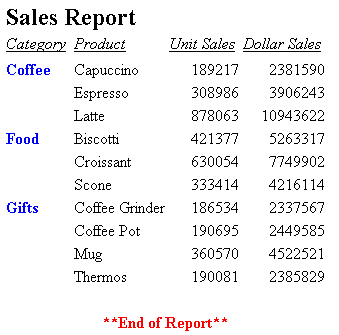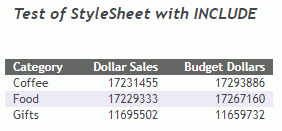Creating a WebFOCUS StyleSheet Within a Report Request
|
How to: |
You can create a StyleSheet within a report request. This enables you to create and maintain the formatting for your report directly in the report request. This type of StyleSheet is known as an inline StyleSheet.
Syntax: How to Create a WebFOCUS StyleSheet Within a Report Request
ON TABLE SET STYLE[SHEET] * declaration [declaration] . . . [ENDSTYLE]
where:
- SHEET
- Can be omitted to make the command shorter, and has no effect on its behavior.
- declaration
- Is a StyleSheet declaration. StyleSheet declarations usually specify the report component you want to format and the formatting you want to apply. For more information about declarations, see General WebFOCUS StyleSheet Syntax.
- ENDSTYLE
- Indicates the end of an inline StyleSheet. You can omit ENDSTYLE if it is followed immediately by END in the report request.
Example: Creating a WebFOCUS StyleSheet Within a Report Request
The following illustrates an inline StyleSheet. The StyleSheet is highlighted in the request.
TABLE FILE GGSALES SUM UNITS DOLLARS BY CATEGORY BY PRODUCT HEADING "Sales Report" FOOTING CENTER "**End of Report**" ON TABLE SET PAGE-NUM OFF ON TABLE SET STYLE * TYPE=REPORT, GRID=OFF, $ TYPE=HEADING, FONT=ARIAL, SIZE=12, STYLE=BOLD, $ TYPE=TITLE, STYLE=ITALIC, $ TYPE=DATA, COLUMN=N1, STYLE=BOLD, COLOR=BLUE, $ TYPE=FOOTING, COLOR=RED, STYLE=BOLD, $ ENDSTYLE END
The output is:

Syntax: How to Include a StyleSheet File in Another StyleSheet
INCLUDE = stysheet,$
where:
- stysheet
-
Is the StyleSheet file to include.
StyleSheet declarations are applied in the order in which they are found in the StyleSheet. Therefore, if you want to include a StyleSheet file and then override some of the attributes within it, place the INCLUDE statement first, then the declarations that override specific attributes below it.
Example: Including a StyleSheet File in Another StyleSheet
The following request includes one of the distributed WebFOCUS StyleSheet Sin the inline report StyleSheet and overrides the heading style to be bold and italic.
HEADING CENTER "Test of Stylesheet with Include" " " SUM DOLLARS BUDDOLLARS BY CATEGORY ON TABLE HOLD AS STYLE2 FORMAT HTML ON TABLE SET STYLE * INCLUDE=IBFS:/FILE/IBI_HTML_DIR/javaassist/intl/EN/ENIADefault_combine.sty,$ TYPE=HEADING, STYLE = BOLD+ITALIC,$ END
The output is shown in the following image.
